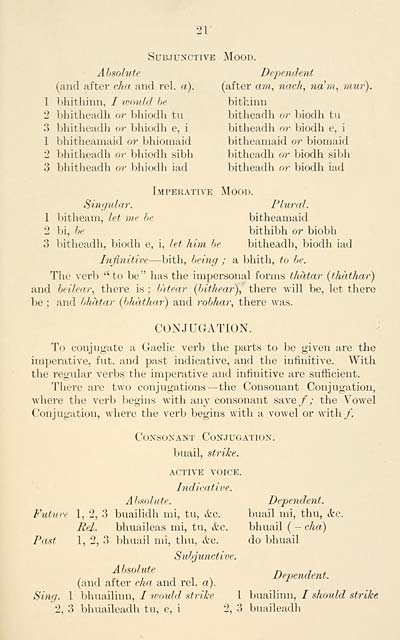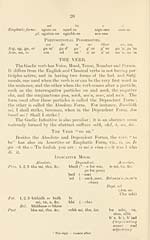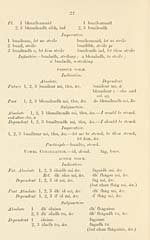Download files
Complete book:
Individual page:
Thumbnail gallery: Grid view | List view

21
Subjunctive Mood.
Absolute Dependent
(and after clia and i-el. a). (after am, nach, na!m, nncr).
1 Ijhithiiin, / irnuld he bithiiiii
2 bhitheadh or Ijhiodh t\\ bitheadh or ])iodh t\i
3 bhitheadh or bhiodh e, i bitheadh or biodh e, i
1 bhitheamaid or bhioinaid bitheamaid or bioniaid
2 bhitheadh or bhiodh sibh ])itheadh or liiodh silih
3 bhitheadh or bhiodh iad l)itlieadli or biodh iad
Imperative Mood.
Singular. Plural.
1 bitheain, let me he bitheamaid
2 bi, he l)ithibh or biobli
3 bitheadh, biodh e, i, let him he bitheadh, biodh iad
Infinitive — bith, being ; a bhith, to he.
The verb "to be" has the impersonal forms tlmtar (thàthar)
and beilear, there is; hitear (bit/iear), there will be, let there
be ; and hkàtar (bhàfhar) and robhar, there was.
CONJUGATION.
To conjugate a Gaelic verb the parts to be given are the
imperative, fut. and past indicative, and the infinitive. With
the regular verbs the imperative and infinitive are sufticient.
There are two conjugations— the Consonant Conjugation,
Avhere the verb ])egius with any consonant save f/ the Vowel
Conjugation, where the verb begins with a vowel or with/.
Consonant Conjugation.
buail, strike.
ACTIVE VOICE.
Indicative.
Absolute. Dependent.
Future 1, 2, 3 buailidh mi, tu, kc. buail mi, thu, ite.
Rel. bhuaileas mi, tu, etc. bhuail ( - eha)
Past 1, 2, 3 bhuail mi, thu, <kc. do bhuail
Subju7ictive.
. ^ fj^'^'f , , , Dependent.
(and after eha and rel. a).
Sing. 1 bhuailinn, / voidd strike 1 buailinn, / should strike
2, 3 bhuaileadh tu, e, i 2, 3 buaileadh
Subjunctive Mood.
Absolute Dependent
(and after clia and i-el. a). (after am, nach, na!m, nncr).
1 Ijhithiiin, / irnuld he bithiiiii
2 bhitheadh or Ijhiodh t\\ bitheadh or ])iodh t\i
3 bhitheadh or bhiodh e, i bitheadh or biodh e, i
1 bhitheamaid or bhioinaid bitheamaid or bioniaid
2 bhitheadh or bhiodh sibh ])itheadh or liiodh silih
3 bhitheadh or bhiodh iad l)itlieadli or biodh iad
Imperative Mood.
Singular. Plural.
1 bitheain, let me he bitheamaid
2 bi, he l)ithibh or biobli
3 bitheadh, biodh e, i, let him he bitheadh, biodh iad
Infinitive — bith, being ; a bhith, to he.
The verb "to be" has the impersonal forms tlmtar (thàthar)
and beilear, there is; hitear (bit/iear), there will be, let there
be ; and hkàtar (bhàfhar) and robhar, there was.
CONJUGATION.
To conjugate a Gaelic verb the parts to be given are the
imperative, fut. and past indicative, and the infinitive. With
the regular verbs the imperative and infinitive are sufticient.
There are two conjugations— the Consonant Conjugation,
Avhere the verb ])egius with any consonant save f/ the Vowel
Conjugation, where the verb begins with a vowel or with/.
Consonant Conjugation.
buail, strike.
ACTIVE VOICE.
Indicative.
Absolute. Dependent.
Future 1, 2, 3 buailidh mi, tu, kc. buail mi, thu, ite.
Rel. bhuaileas mi, tu, etc. bhuail ( - eha)
Past 1, 2, 3 bhuail mi, thu, <kc. do bhuail
Subju7ictive.
. ^ fj^'^'f , , , Dependent.
(and after eha and rel. a).
Sing. 1 bhuailinn, / voidd strike 1 buailinn, / should strike
2, 3 bhuaileadh tu, e, i 2, 3 buaileadh
Set display mode to: Large image | Transcription
Images and transcriptions on this page, including medium image downloads, may be used under the Creative Commons Attribution 4.0 International Licence unless otherwise stated. ![]()
| Early Gaelic Book Collections > Blair Collection > How to learn Gaelic > (31) |
|---|
| Permanent URL | https://digital.nls.uk/79789426 |
|---|
| Description | A selection of books from a collection of more than 500 titles, mostly on religious and literary topics. Also includes some material dealing with other Celtic languages and societies. Collection created towards the end of the 19th century by Lady Evelyn Stewart Murray. |
|---|
| Description | Selected items from five 'Special and Named Printed Collections'. Includes books in Gaelic and other Celtic languages, works about the Gaels, their languages, literature, culture and history. |
|---|

